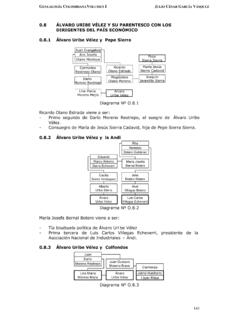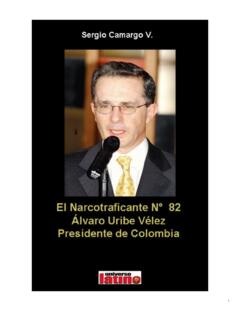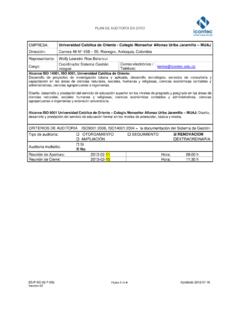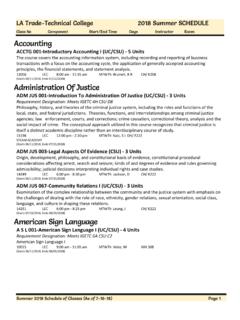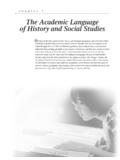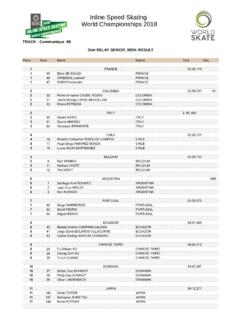Transcription of A Study on the Relationship between Canadian …
1 FPP-06-04 A Study on the Relationship between Canadian Aboriginal Peoples and the Canadian State Julieta uribe EXECUTIVE SUMMARY Aboriginal peoples are considered as one founding nation of Canada. Before European settlers arrived, Aboriginal peoples already had governance structures and legal systems. Aboriginal peoples had two choices: either adapt or assimilate to the foreign culture and system, or to keep its own and ignore the settlers, which ended up in conflict. The Relationship between Aboriginal peoples and the settlers started through the signature of treaties. This Relationship began with the French who arrived first and continued with the British, who won the war against the French in the 1860s. Through the enactment of legal bodies, such as the British North American Act and the Indian Act, the rights of Aboriginal peoples in Canada were not recognized nor protected.
2 It was until the Constitution Act of 1982 when Aboriginal peoples had their collective rights recognized. However, there are still many flaws within the Law, and precedents need to be created through certain Supreme Court decisions about inherent or treaty rights of Aboriginal peoples. The creation of precedents is very recent, as the enactment of the Constitution happened only twenty-four years ago. Despite there are Aboriginal peoples in Canada, one cannot depict the three of them as one unit, as there are many differences between them, and therefore, they have received different treatment by the Canadian state. Such differences have created conflict and divisions, and therefore to try to give all Canadian Aboriginal peoples the same treatment is a mistake, as they differ all from one another, and even within their own people.
3 The Relationship between Aboriginal peoples and the Canadian state needs to be redefined and try to pass into a post-colonial era in order to find harmony between them. 1R SUM Les peuples autochtones sont une nation fondatrice du Canada. En fait, les peuples autochtones ont d j des syst mes l gaux et des structures de gouvernance avant que les colonisateurs sont arriv s. Les peuples autochtones ont eu deux options : s assimiler la culture trang re ou bien maintenir ses propres m thodes et ignorer les colonisateurs. Cette situation a termin en conflit. Le rapport entre les peuples autochtones et les colonisateurs a commenc par les trait s. Cette relation a commenc premi rement avec les Fran ais qui sont arriv avant que les Britanniques et a continu avec les derni res, car ils ont gagn la guerre contre la France dans les ann es 1860s.
4 Il s tait par la formation des corps l gaux, comme l Acte nord-am ricain et l Acte indienne que les droits des peuples autochtones au Canada n taient ni reconnus ni prot g s jusqu la r daction de la Constitution de 1982 pour laquelle les droits collectifs des peuples autochtones ont t reconnus. N anmoins, il y a encore beaucoup des fautes dans la loi. Il faut cr er des pr c dents pour la Cour Supr me du Canada sur certains droits inh rents aux peuples autochtones. La cr ation des pr c dents c est tr s r cent car la r daction de la Constitution a pris lieu il y a 24 ann es. Les peuples autochtones au Canada sont tr s diff rents et on ne peut pas les montrer comme une unit . Par cons quence, ils ont re u un traitement diff rent pour la partie de l tat canadien.
5 Ces diff rences ont cr e des conflits et des divisions. En effet, le d sire de donner le m me traitement aux touts les peuples autochtones c est une erreur, car il y a des vraies et grandes diff rences entre eux et entre chaque un d eux. Le rapport entre les peuples autochtones et l tat canadien a besoin d tre redessin en m me temps qu essayer de passer une poque post-coloniale pour trouver l harmonie entre eux. RESUMEN Los pueblos ind genas constituyen una naci n fundadora de Canad . De hecho, antes de la llegada de los colonizadores europeos, los pueblos ind genas contaban ya con sistemas legales y estructuras de gobernabilidad. Los pueblos ind genas ten an dos opciones: o adaptarse y asimilarse a la cultura y sistemas extranjeros, o mantener su propia cultura e ignorar a los colonizadores, lo cual fue origen de conflicto.
6 La relaci n entre los pueblos ind genas y los colonizadores comenz a trav s de la firma de los tratados. Esta relaci n tuvo su origen con los colonizadores franceses, los cuales fueron los primeros europeos en llegar, y luego con los brit nicos, los cuales ganaron la guerra en contra de los franceses alrededor de los a os 1860s. Cabe mencionar que los derechos de los pueblos ind genas en Canad no fueron reconocidos ni protegidos a trav s de la formaci n de cuerpos legales, tales como el Acta Brit nica de Norte Am rica y el Acta Ind gena. Fue entonces hasta 1982 que los derechos colectivos de los pueblos ind genas fueron reconocidos. Sin embargo, existen todav a algunas lagunas dentro de la ley y se necesita la creaci n de antecedentes a trav s de decisiones de la Suprema Corte de Justicia de Canad que trate de los derechos inherentes y derechos derivados de los tratados entre los pueblos ind genas y el estado canadiense.
7 La creaci n de precedentes es muy reciente, toda vez que la Constituci n fue creada hace apenas veinticuatro a os. A pesar de que existan pueblos ind genas en Canad , stos son tan distintos que no pueden concebirse como una unidad y, por lo tanto, han recibido un trato diferente por el estado canadiense. Tales diferencias han creado conflicto y divisiones y es un error tratar de darles el mismo trato. Ciertamente, todos se diferencian el uno del otro y tambi n entre ellos mismos. La relaci n de los pueblos ind genas y el estado canadiense necesita ser redefinida y se debe tratar de pasar a una era post-colonial para encontrar la armon a entre ellos. 2 Introduction Many men and women have built with their heart and spirit a political, economic, and social order, especially in harmony with the land they love as their mother.
8 That is the source of existence of Canada. (Sioui, 2001) Aboriginal peoples are considered as a founding nation of Canada. Aboriginal peoples constitute the first inhabitants of Kanata, which means village in Aboriginal language, and along with the European settlers, represent a founding nation of this beautiful country. Either a member of a First Nation, an Inuit, or a M tis, Aboriginal peoples were already organized according to their own culture and traditions before the settlement of Europeans. Identity, as a result, plays a big role determining the belonging to a certain nation or to the Canadian state. Aboriginal peoples might identify themselves as members of their own nation and/or might consider themselves as Canadians.
9 This is a choice that Aboriginals have as peoples. From an Aboriginal point of view, Canada was a French creation, where Qu b cois and French Canadians are considered as the first non-Aboriginal heirs of Canadian territory. Canada reflects that it founds its identity within the source of its existence created by the respectful and harmonious order between Nature and Mother Earth. Hence, Sioui, who is a representative of Aboriginal peoples, demands the Canadian state the recognition of the special place of Aboriginal peoples in Canada as well as of French Canada. It is said that Canada would not be the same without Aboriginal peoples and Quebec. (Sioui, 2001) It is expected that there will be a reconciliation of Aboriginal peoples with states, as Aboriginal peoples still suffer conflict within their relationships with settler states.
10 For some Aboriginal peoples, this means an opportunity to improve their quality of life. For others, to obey the state means to lose independence and to be culturally separated, this means assimilation. (Borrows, 1995-1996) The present paper represents an overview of the evolution of legal and political framework of the Relationship between Canadian Aboriginal peoples and the Canadian state, starting from First Nation s Law, the Hawthorn Report and the White Paper, the Charlottetown Accord, the Report of the Royal Commission on Aboriginal Peoples, and the Treaties signed between Aboriginal peoples and the Canadian sovereign. Later on, an overview of Canadian Aboriginal peoples, of Aboriginal and Treaty rights, as well as of the Crown s duty to consult will be studied.
